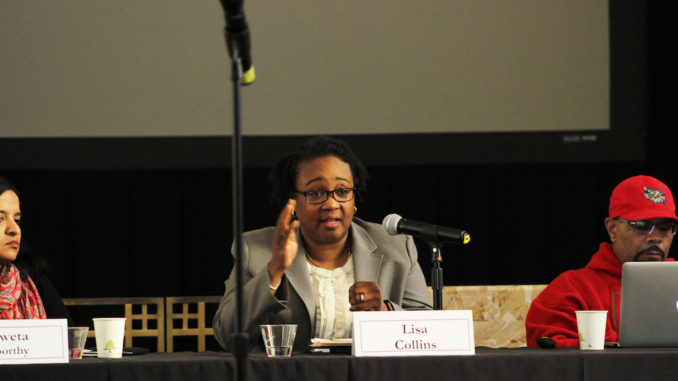
By Audrey Barrett
Lwis & Clark Graduate School’s Center for Community Engagement organized a panel discussion event on Feb. 10. as part of a training series to instruct attendees about instances of hate and bias experienced by those in the Portland area. As recipients of a grant from the city of Portland, the Center for Community Engagement is part of the Portland United Against Hate coalition, but all events are organized independently. The workshop is part of a series of 15, all centered around bolstering the resistance to hate and bias. This workshop, entitled “Friend, Neighbor, Ally: Community Response and Supportive Engagement with those Targeted by Hate and Bias,” was meant to help participants learn to recognize these incidents and intervene in a constructive manner.
“A lot of good people say ‘I don’t see any racism, I don’t know any racists,’ and I’d say ‘You’re looking at one, and I’m looking at one,’” LC President Wim Wiewel said in his opening remarks. “There’s no way we can grow up in this society as white males and not have racism.”
The Portland Against Hate training series seeks to inform people about the prevalence of issues surrounding discrimination and bias as the first step to constructive problem solving.
“White supremacy has never gone. It has just changed, it has morphed,” Executive Director of the Empowerment Clinic Inc. Michael Braxton, one of the speakers, said. “Its simply been redesigned, and now the racial caste functions through the criminal justice system.”
Four panelists spoke to the audience: Braxton, a doctoral student in clinical psychology who is founder and Executive Director of the Empowerment Clinic, Inc.; Jaboa Lake, a graduate research assistant and doctoral student in applied social psychology at Portland State University; Shweta Moorthy, a researcher for the Coalition of Communities of Color; and Lisa Collins, Associate Director of Secondary Education for North Clackamas school district spoke. Each panelist took a different approach to illustrating issues such as microaggressions, systemic inequality, hate crimes and the role of allies.
Lake prefers the term “accomplice” to the term “ally.”
“You can say that you’re an ally, but that’s kind of passive sometimes,” Lake said. “Saying that you’re an accomplice implies that you are more active in fighting oppression.”
Lake believes it is important for people in positions of power to step in when they see instances of hate.
“But at the same time, a lot of people who experienced hate say that they prefer to speak up for themselves,” Lake said.
“You have what’s called the white savior complex,” Moorthy said. “White people assume that they know better or are coming in to save black and brown people … It’s a very human reaction. But in a racist structural context, you can take away agency and autonomy from the people who have been battling (racism) for a long time.”
Lake and Moorthy collaborated on a project, using a community-based participatory research approach to analyze how people of color in the Portland area define and experience hate and the barriers that prevent people from reporting incidents. They organized focus groups to create a safe space for participants to talk about experiences with hate and bias.
“Sometimes you can be endangered just by expressing that (experience), if you’re transgender, undocumented, things like that,” Lake said. “Sometimes, the people who are inciting hate are also the people they would report to.”
Moorthy said that one of the greatest takeaways for her was how communities defined hate and how it can look different than we might expect it to. After the stabbing on the Portland TriMet MAX line in May 2017, which occurred after a bystander intervention in an instance of hate speech, those definitions demonstrated how impermanent they were.
“We were finally talking about white supremacy in the mainstream in a way that I hadn’t seen before,” Moorthy said. “But at the same time we started looking at the act of hate in a very very narrow way, which is the real physical violence that happened in that moment.”
In Moorthy’s opinion, this discounts less blatant acts of hate such as bullying or microaggressions.
Moorthy, an Indian immigrant, opened up about her experience as a target of hate. She used the example of an experience she had getting into an argument with a person who identified as white over a parking spot.
“It really escalated, to the point where the person said ‘Go back to where you came from’ and that really stung,” Moorthy said. “I was speechless and I spent a couple of days sort of swinging between crying and figuring out what I could have said.”
Collins approached these issues through the lens of her experience in education.
“It’s so interesting to examine all the day-to-day microaggressions that happen inside our educational system while we are also trying to educate a student,” Collins said. “We squash kids’ little spirits early, and then when they get to third grade we wonder why they’re angry.”
Like Lake, Collins believes it is crucial for people of color to have agency over their own situation. She also advocates for putting them in positions of power for kids to look up to.
These panelists believe we need a more informed body of allies in the fight against systemic white supremacy, which is why they do workshops like this.
“Racism cannot be solved without white people,” Braxton said. “Black people can’t solve racism. If we could, we’d have done it already!”
Correction Feb. 18, 2018, 11:39 a.m.: The original version of the article misstated the organizer of the event. The event was organized by the Lewis & Clark Graduate School’s Center for Community Engagement, not Portland United Against Hate.
Subscribe to the Mossy Log Newsletter
Stay up to date with the goings-on at Lewis & Clark! Get the top stories or your favorite section delivered to your inbox whenever we release a new issue.

Leave a Reply